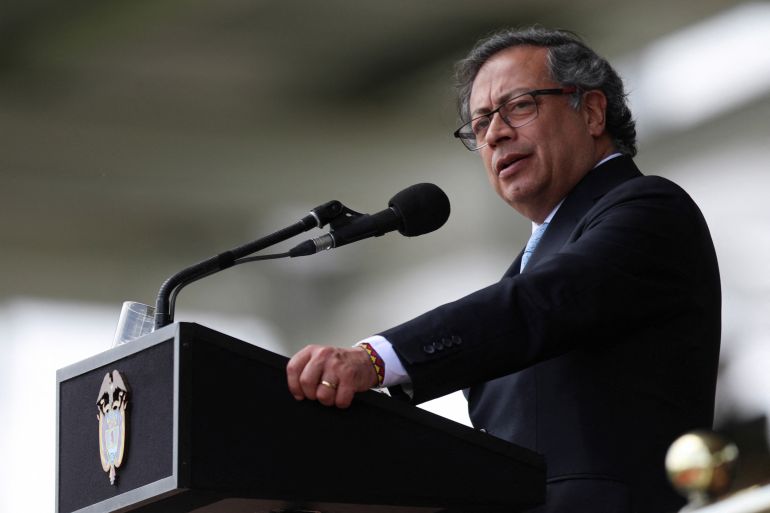Colombia suspends rebel ceasefire after Indigenous teens killed
The decision targets members of the Estado Mayor Central rebel group after reports of minors being forcibly recruited.

The administration of Colombian President Gustavo Petro has announced it is suspending a ceasefire agreement with a rebel group accused of killing four Indigenous people in a recent attack.
The government said on Monday that it will resume attacks on the Estado Mayor Central (EMC) group, a splinter of the now-disbanded Revolutionary Armed Forces of Colombia (FARC), once the country’s largest rebel group.
Keep reading
list of 3 itemsPlunging coca prices create ‘humanitarian emergency’ in Colombia
Why is Colombia so deadly for human rights activists?
The temporary suspension applies to the provinces of Caqueta, Putumayo, Guaviare and Meta. The ceasefire with the EMC will remain in effect in other regions.
“If a bilateral ceasefire is not effective in protecting the life and integrity of the entire population in certain territories, then there is no point in persisting,” a government statement said.
The incident underscores the difficulty of securing peace in a country where various armed groups jostle for control of resources and territory, often bringing violence and displacement to regions where they are active.
Comunicado a la opinión pública sobre el cese al fuego con el EMC-FARC. pic.twitter.com/Wunu8xIQuT
— Gustavo Petro (@petrogustavo) May 22, 2023
Last week, Indigenous organisations accused the EMC of killing four people who tried to evade forced recruitment in the southern province of Putumayo. All four victims were Indigenous minors, according to a government statement on social media.
On Saturday, the Petro administration called the slayings an “assault on peace”. The president continued to criticise the violence on Monday through his Twitter account.
“Killing Indigenous children is an unacceptable crime against humanity,” Petro wrote. “To forcibly recruit minors is the same.”
In Colombia and throughout South America, Indigenous communities are often subjected to violence from criminal groups seeking to carry out illegal operations in areas where they live.
The attacks also highlight the challenges Petro faces as he tries to implement an agenda of “total peace” to combat Colombia’s nearly six-decade-long internal conflict.
Petro, the country’s first left-wing president and a former guerrilla fighter, has sought to distance himself from the heavy-handed, military-centred approach of his predecessors.
But his emphasis on negotiations with armed groups, however, has yielded mixed results. A Red Cross report released in March found that, while violence between armed groups and government forces had dropped, civilians continue to face displacement and violence from armed groups.
Those mixed results were further on display when, around the New Year holiday, Petro announced that his government had reached a series of ceasefire agreements, including with the EMC and other FARC dissident groups like the Segunda Marquetalia.
But almost immediately, he had to backtrack on claims that a truce had also been reached with the National Liberation Army (ELN), the largest remaining rebel group, after it denied the existence of such a ceasefire.
And the ceasefires that did remain have hit stumbling blocks. Petro has since accused the Gulf Clan criminal group of violating its ceasefire.
Attempts at a ceasefire have continued, meanwhile, with the ELN, with the latest round of talks held in Cuba. But those negotiations have been fraught with tensions, particularly after the group allegedly killed nine Colombian soldiers in late March.
“When Petro came into power, essentially he had promised to try and reach what he calls ‘total peace’,” Al Jazeera correspondent Alessandro Rampietti explained.
“This was seen as very ambitious, but also a lot of these groups saw the opportunity [of] having, for the first time, a leftist president to negotiate with — somebody who was less bellicose than previous Colombian governments,” he said.
“But so far, this plan has been big on announcements and big on the president’s vision but has achieved very little in terms of practical effects.”
Groups like the EMC were created in the wake of a historic 2016 peace deal, which saw the FARC disband as an armed force. More than 14,000 fighters agreed to demobilise — a milestone in a conflict that has killed hundreds of thousands of people.
Some groups, however, refused to participate in the 2016 peace accord. Former FARC commanders formed their own splinter organisations, like the EMC.
Petro, who inherited the legacy of this 2016 deal, has sought to engage directly with groups like the EMC to see them disarm as well.
But as Rampietti reports, Petro’s approach has been criticised as too soft by some in the political opposition. Incidents like the deaths of the four Indigenous youths only amplify those concerns.
“Consider that formal negotiations with this group were supposed to start on May 16 but were postponed while the government negotiators in this group were still trying to finesse the details of, among other things, exactly how the truce was expected to work,” Rampietti said.
“Essentially this is, unfortunately, just the latest setback in a series of setbacks that Petro’s peace policy in the country has seen since he came into power last August.”